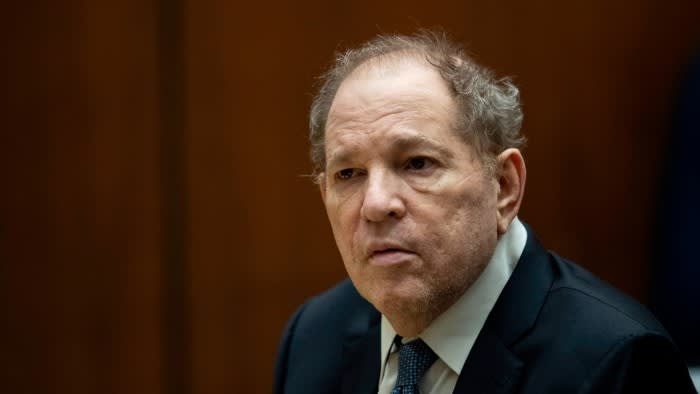
Unlock the Editor’s Digest for free
Roula Khalaf, Editor of the FT, selects her favourite stories in this weekly newsletter.
New York’s highest court has overturned Harvey Weinstein’s conviction for sex crimes and rape, and ordered a new trial for the once-powerful film mogul whose reported abuse of women had become one of the driving forces behind the #MeToo movement.
Weinstein was found guilty in New York in February 2020 and sentenced to 23 years in prison. He had appealed against the verdict, citing testimony from women who were not part of the case that may have unlawfully swayed the jury.
The court in a 4-3 decision on Thursday agreed with Weinstein that the prosecution should not have used “prior convictions or proof of the prior commission of specific, criminal, vicious or immoral acts” to establish Weinstein’s “propensity for criminality”.
It concluded that the trial judge had “erroneously admitted testimony of uncharged, alleged prior sexual acts against persons other than the complainants of the underlying crimes”.
The New York Court of Appeals ordered a new trial. The decision does not affect Weinstein’s 2022 conviction on charges of rape and other sex crimes in California, for which he was sentenced to 16 years in prison.
A spokesperson for the office of the Manhattan district attorney, which brought the original case, said: “We will do everything in our power to retry this case, and remain steadfast in our commitment to survivors of sexual assault.”
Weinstein’s New York conviction, a landmark moment in the #MeToo movement aimed at holding powerful men accountable for sexual abuse and harassment against women, came following a six-week trial over five charges based on two alleged incidents: raping Jessica Mann, an aspiring actress, in 2013 and forcing oral sex on Miriam Haley, a production assistant, in 2006.
A jury determined that Weinstein was guilty of two of the five felony charges against him: committing a first-degree criminal sexual act, and third-degree rape charges. He was acquitted of the most serious charges against him: predatory sexual assault and first-degree rape.
Three women who were not bringing claims against Weinstein testified against him during trial, detailing unwanted sexual advances against them by the Hollywood power-player.
The jury was instructed that this evidence “must not be considered for the purpose of proving that the defendant had a propensity or predisposition to commit the crimes charged”.
But the appeals court’s majority said the effect of their testimony “was to bolster their credibility and diminish defendant’s character before the jury”.
In a dissenting opinion, Court of Appeals judge Madeline Singas said the decision by her co-jurists meant that henceforth “juries will remain in the dark about, and defendants will be insulated from, past criminal acts”, adding that “ultimately, the road to holding defendants accountable for sexual assault has become significantly more difficult”.
Read More: World News | Entertainment News | Celeb News
FT








